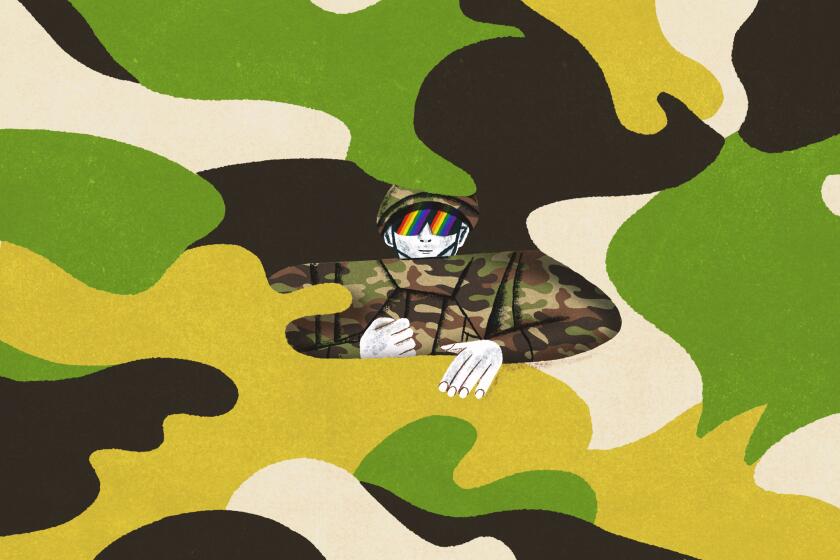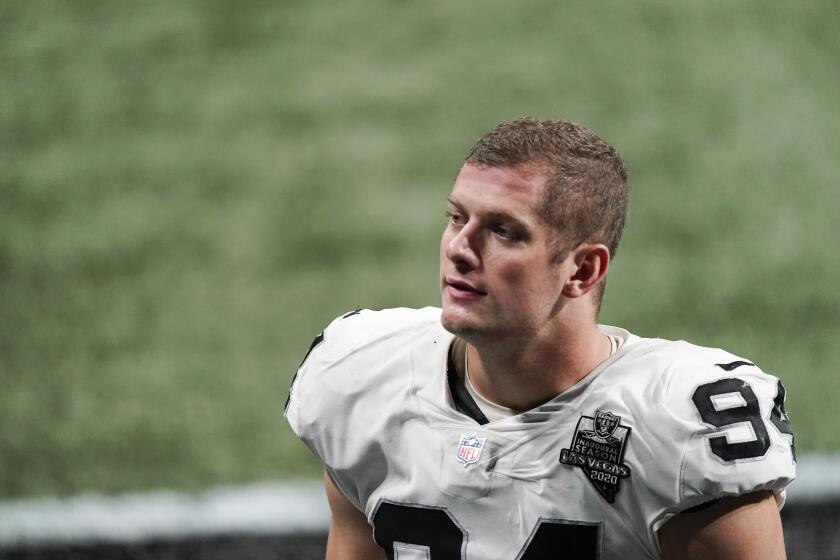My first gay role model
- Share via
In 1995, I was 24 years old and still living with my family, including my overprotective mother. I was still in the closet at home. I had recently graduated from community college and had no roadmap to follow.
Then my best friend and his girlfriend signed a lease on a two-bedroom apartment in Hollywood, and after she backed out on their plans to move in together, I took her place. I got a job at a store on the Third Street Promenade in Santa Monica that sold furniture and custom framed art. On Friday and Saturday nights, we’d blast disco music and drunken shoppers would stumble in and occasionally pass out on the display sofas. I was on my own, out, single and gay, liberated from the shame and guilt that had colored so much of my adolescence.
I reveled in my newfound independence. At night, I frequented seedy bars along the darker corridors of Santa Monica Boulevard and had anonymous sexual encounters with men. I developed a newfound pride in my promiscuity, saw it as a badge of honor. I guess this is what it’s supposed to be like, I told myself.
Navigating gay Los Angeles, I’ve been caught between two seemingly incompatible identities — queer and military. Both are important to me. Embodying both can sometimes feel impossible.
There was a help center at the corporate office of the furniture retailer I worked for to deal with difficult customers, and Brent was assigned to my store. At first, he was a voice on the phone, patient and jovial on our multiple daily calls about problem accounts. Soon, our discussions evolved into gossip sessions about random drama at one of the other stores or the machinations of upper management at the main office. Over the course of those conversations, Brent and I discovered that we shared the same taste in music (’80s new wave) and television (“I Love Lucy” and “Twilight Zone” reruns), among other things. We could quote whole scenes from “The Adventures of Priscilla, Queen of the Desert” and “Muriel’s Wedding” from memory. We were born in the same year, our birthdays only two days apart.
We started spending long afternoons in Santa Clarita where he lived with his partner, Frank. Both of their families were nearby, and they all celebrated birthdays and holidays together, went on trips together, had dinners together. Brent and Frank’s home was impeccably decorated. There were matching throw pillows on the couches, dining chairs upholstered in custom fabrics, the walls and side tables were crowded with pictures, and they slept in a big bed.
In his life, through his lasting relationship with Frank, I caught a glimpse of what I could have. Brent became my first gay role model. We remained friends long after we each left our jobs at the furniture retailer, even after he and Frank moved to Colorado in 2005.
Over the last few years, Brent was involved in a lawsuit against a former public employer that he alleged had discriminated against him because of his sexuality. The employer asserted governmental immunity from discrimination claims, the only state law protecting LGBTQ employees at the time. The suit went to the Colorado Supreme Court, which sided with Brent — this allowed his attorneys to move forward with discovery to prove Brent’s case.
Some of his colleagues testified that they had witnessed the employer’s LGBTQ discrimination against Brent. Eventually, his employer settled. In great part due to this years-long fight, Colorado law now gives the state’s public employees equal remedies from discrimination and retaliation.
This past October, on a quiet Sunday evening, as my partner and our dogs slept in our bedroom, I received a text message from Frank: Brent had unexpectedly passed away. He was here in Southern California when he died, staying with Frank’s parents and dropping in on friends and family. I don’t know if I was on his schedule for a visit. I like to think I was.
Brent’s lawsuit in Colorado showed how the actions of one person can affect a whole community. There’s hope in seeing someone fight with such zeal for the disempowered. The LGBTQ community will benefit from this for years to come.
Nassib is a rich, cisgender white man, but that doesn’t mean coming out is easy when more than 250 anti-LGBTQ bills have been introduced around the country.
He remained a role model outside public life too. Growing up, I was taught that being gay was an aberration, something to be ashamed of, something not worth fighting for. Brent taught me it was important to face my shame head on, with humor and a clear head, to move past it to find the better parts of myself I didn’t know were there.
I, and countless others in a community that survives — and thrives — despite uncertainty and the bigotry we often face, will always remember his profound influence on our lives.
Alex Espinoza is the Tomás Rivera Endowed Chair of creative writing at UC Riverside. His latest book is “Cruising: An Intimate History of a Radical Pastime.”
More to Read
A cure for the common opinion
Get thought-provoking perspectives with our weekly newsletter.
You may occasionally receive promotional content from the Los Angeles Times.











